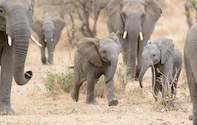
Proceedings from the workshop will be sent to Environmental Affairs and Tourism minister Marthinus van Schalkwyk, who is currently awaiting a large herbivore management plan from South African National Parks (Sanparks).According to spokesperson Wanda Mkutshulwa, the report is complete, and Sanparks is expecting to present it to the minister before the end of August. Michele Pickover from Xwe African Wildlife, one of the hosts of the workshop, says that Elephants Alive was intended to help the minister and Sanparks to find a more creative solution for managing elephant populations.
She believes that Sanparks is not doing what it has been mandated to do, has not carried enough consultation, and in a letter to the minister stated that Sanparks has "a definite institutional mind-set that was pro-culling".She says there must be alternatives to "Let's pick up a gun - we can be a lot more creative than that." She believes that culling should never be a management tool for elephants, saying "Is there ever a time for mass genocide?"
Presentations at the workshop included an overview of the existing published Sanparks management plan, the legal and ethical issues surrounding culling, Prof Rudi van Aarde's megapark plan for linking Southern Africa's elephant populations, contraception methods in elephants, whether culling elephants would conserve biodiversity, green hunting, lessons learnt from keeping elephants in captivity around the world, and an overview of what happened with the elephant population in Tsavo National Park.Sanparks declined to attend the workshop, but asked for a copy of the proceedings. According to Mkutshulwa, Sanparks has already finalised their report on the management of large herbivores, and said "The people that were there had already been involved in the elephant indaba, and there would be nothing new to bring to put in the report." She added, "Culling can only be one of a number of tools for the management of large herbivores.It is not the alpha and omega, the ultimate - it is only part of a toolbox to manage biodiversity." She called it "short-sighted" to reduce the issue "to culling or not culling" and said that people should look at the issue "more broadly". Although it was considered that there is not currently an elephant overpopulation in Kruger, the issue of how to achieve biodiversity conservation with elephants in the system was considered.
Climate Change
One of the presenters at the workshop, Bruce Page, an ecology lecturer at the University of KwaZulu Natal, says, "There is way more to worry about from climate change than from lephants." He says that South Africa could lose as many as three-quarters of its species due to climate change.Respected ecologist Prof Norman Owen-Smith, also attending the workshop, says that the big issue is how to make decisions in the face of uncertainty. Leaving the elephant population alone may have unknown consequences in the long term.If species are lost in the long term due to elephants, it is too late to do anything about it by the time the damage is done. However, he believes that elephant impacts can be managed in other ways than culling, but does not rule out the selective shooting of elephants if the herbivores are threatening the survival of another species.
The issue of the scale at which biodiversity should be conserved came up at the workshop. Page says that people should look outside of Kruger to other places that have the same species. Even if elephant activity threatens certain plant species in the park, they are unlikely to become extinct if they are found elsewhere in the country. He points out that many species that scientists have raised concerns over were already declining in the park while the culling policy was in place, showing that renewing culling is unlikely to stop this decline, although it may slow the process.
Fire and Water
Page believes that the previous burning policies in the park have done more to shape the vegetation structure that we see today than elephants have, going so far as to say all fires that are started in the park by any means should be extinguished. "The notion that fire is natural in the system does not stand up." Another tool put forward at the workshop was the reduction of artificial waterpoints. Kruger has already begun a programme of closing boreholes, with more than 180 having been shut down in recent years.Research has shown that elephants tend to concentrate much of their damage around water, and if waterholes are too close together the damage effectively covers the entire landscape. Making waterpoints further apart separates the damage, leaving areas of untouched woodland. Some elephants will also move away in search of other water, which helps spread the population around.This could help elephants move faster into the Limpopo National Park alongside Kruger, but also into the private nature reserves alongside Kruger, which often have a higher density of artificial water than is found in the park. One thing that everyone involved with elephant management seems to agree on is that more research should be done on almost anything relating to these popular mammals, to help guide future management.By Melissa Wray
Learn more about Elephant Population Management in Kruger Park

